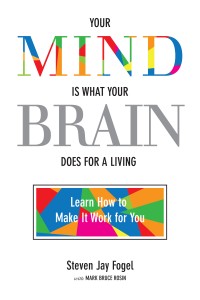Pause Your Machinery: Frog in Hot Water Relationships

Stop and take a moment to “pause your machinery.” The concepts and techniques I present throughout my latest book, Your Mind Is What Your Brain Does for a Living, require mindfulness to learn and master, and this brief written exercise will give you the opportunity to rest, step outside the pattern of passive reading, and bring yourself into the present moment to reflect and see how the information I want to share with you can be integrated into your own life.
Keep your written answers, because they will be valuable for you to review and refer to later. You may want to buy a notebook or open a computer file so that you can keep all of your responses together in one place.
- Do you repeatedly have fights about the same issue or issues with your significant other, a family member, a friend, or someone you work with? Describe the issue. Think mindfully to see if unconsciously you may be investing the issue with another meaning. For example, if you’re continually fighting with your significant other about his being what you consider messy in your home, and he ignores your requests to be neater and gets defensive, are you interpreting this as a lack of respect for you?
- Are you further interpreting the lack of respect as a lack of loving you? Describe any meanings that you now recognize as being the underlying issue(s) about which you’ve been fighting.
- Think mindfully about whether your programming is causing you to overreact in these fights. (Sometimes a lack of neatness is just a lack of neatness in the other person’s habits; it doesn’t necessarily have to do with his or her feelings about you.)
- If you conclude that you’re taking something personally that isn’t really personal, you can resolve the issue within yourself. If you feel that you need to address the underlying issue mindfully with the other person, have a conversation about the real issue, not the “cover” issue.
- If you and your partner are continually fighting about money, are you really fighting about money or are you really fighting about control? Are one or both of you, perhaps unconsciously, trying to use money to control the other or reacting because you feel the other person is trying to control you? Or is money a cover issue for fighting about love? Do one or both of you feel that if your partner doesn’t agree with your perspective about spending money, the other person doesn’t love you?
- Remember that when you are mindful, you are not defensive; you are in the present, you are open to possibility, to authentic communication; you’re not coming in with a preconceived notion of “right” and “wrong” to which you’re going to pressure the other person to acquiesce. That’s not being mindful; it’s being run by your machinery!
- If you’re in a frog-in-hot-water relationship or situation or one that has the potential to become one, think mindfully about whether you may have been acting on automatic pilot in ways that are causing problems in your relationship or situation. For example, do you sometimes act on automatic pilot and behave impulsively when it would be better for you to think before you act? Or, if your default programming judges anger to be “wrong” or “bad,” do you suppress your anger and act in a passive or passive-aggressive way that causes other people to be angry at you? Do you act angrily without recognizing it or taking responsibility for it?
- Fear is also an important emotion to look at in terms of a frogin-hot-water relationship or situation. What fears are embedded in your programming and how do they affect this relationship or situation?
- Describe any other dysfunctional elements in your programming that, when you’re on automatic pilot, are resulting in your behaving in ways that encourage the persistence of your frog-inhot-water relationship or situation.
- In a frog-in-hot-water relationship or situation or one that has the potential to become one, do you feel shamed or blamed by another person’s comments that are critical of the way you act? If so, describe the comments. Do your best to write them accurately, using the words that the person actually spoke.
- When you’ve finished, think mindfully about whether in reality the person was shaming or blaming you or if it was your listening that made you interpret these comments this way because of your own inner critic.
- If you conclude that the person wasn’t shaming or blaming you but rather you reacted from your programming, it opens the space for you to hear and consider the other person’s feedback in a new way that allows for possibility.
- If you conclude that the person was actually shaming or blaming you, have a conversation with the other person about how you feel when this happens. Explain how he or she can express herself or himself to you in such a way that you won’t be hurt or defensive and can instead hear the feedback and be open to modifying your behavior.
- Did you bring a myth with you into the relationship or situation? If so, describe this myth. For example, you might have brought in the myth that you are a savior who will cure everything that’s wrong with the other person or that he or she will cure everything that’s wrong with you and solve all your problems.
- If you did bring in a myth, describe how you came to believe this myth about yourself. What would it take for you to release the myth and live free of its obligations and restrictions?
An excerpt from my recent book, Your Mind Is What Your Brain Does for a Living, now available at Amazon.
- 2 Mar, 2015
- Posted by Steve Fogel
- 0 Comments



COMMENTS